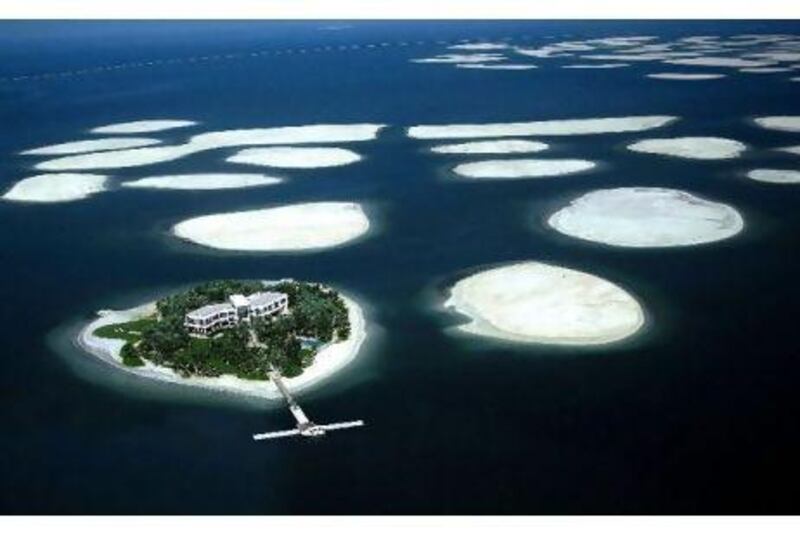The World islands located off the coast of Dubai are eroding and their navigation channels are cloging up with silt, the Dubai World Tribunal heard yesterday.
The allegations were made yesterday by a company hired by the developer of the man-made islands project to ferry goods and people to and from the development.
"The islands are gradually falling back into the sea," said Richard Wilmot-Smith QC of London, who was acting on behalf of Penguin Marine - which has an exclusive contract for all transport of construction materials and staff to and from the islands. The evidence shows "erosion and deterioration of The World islands", he said.
The World was one of the first major projects in Dubai to suffer a slowdown in late 2008 as property prices began to tumble and developers faced financial difficulties. Made up of about 300 artificially created islands in the shape of the continents, The World is one of the most well-known projects in Dubai. So far, the only major activity was at the Heart of Europe, a project by the Austrian developer Josef Kleindienst, and Lebanon, which is being developed by the Indian investor Wakheel Ahmed, lawyers said yesterday.
Penguin had asked the Tribunal to stop Nakheel from cashing a performance bond and an advanced payment guarantee together totalling more than Dh6.86 million (US$1.86m) after Penguin stopped paying an annual fee to the company - also called The World - in charge of the project. The company is fully owned by Nakheel. The three-judge Tribunal rejected the claim yesterday and said it would provide a full explanation for its decision in the coming weeks.
Mr Wilmot-Smith, who was hired by Penguin's local lawyers at Hadef & Partners, contended that the "deteriorating" state of The World was proof that work had "effectively stopped" on the project and that Penguin should no longer be obliged to pay an annual fee of either Dh5 million or 15 per cent of revenue, whichever is larger. Graham Lovett, the regional managing partner of the international law firm Clifford Chance who was representing Nakheel before the Tribunal, said the project had not been cancelled but was slowed by the global financial crisis.
Disagreeing with Mr Wilmot-Smith's description of the project as "dead", he said The World was in "a coma" but would be revived as market conditions picked up.
"This is a 10-year project which has slowed down," Mr Lovett said. "This is a project that will be completed."
Mr Lovett said the annual fee Penguin paid to The World company was what it agreed to pay to have a monopoly on all transport to the islands.
"That's the price Penguin makes to stay in the game," he said. "They have the potential to earn millions … when [the project] comes out of a coma."
Penguin Marine, which is affiliated with the Singapore marine equipment and logistics company Penguin International, has spent Dh25m on building infrastructure at Port Rashid to handle the flow of materials and construction workers to the islands, Mr Wilmot-Smith said.
Penguin said in a filing to the Dubai World Tribunal that the "navigation channels .… are so presently ill-defined, and the water depths have been so seriously eroded due to reclaimed sand silting-up the navigation channels, that major reclamation works will henceforth be required on The World islands to allow safe passage of the Respondent's marine vessels to the Islands".
The Dubai Government set up the Dubai World Tribunal in December 2009 to handle all disputes related to the conglomerate Dubai World as it restructures.
A spokeswoman for Nakheel yesterday rejected allegations the islands were sinking into the sea.
"The World islands is not sinking, and our periodical monitoring survey over the past three years didn't observe any substantial erosion that requires sand nourishment," she said.






